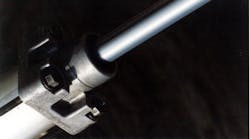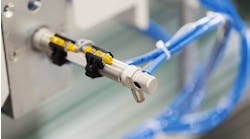Fluid Power Ebook, Edition 1: Fluid Power Basics
Fluid Power Basics starts with background information about simple air and hydraulic circuits, principles of fluid power operation and physical laws governing fluid power. Subsequent chapters cover different types of hydraulic fluids, fluid rating, operating parameters, and how to apply them. Next, a discussion on plumbing of fluid power systems covers tubing, pipe, and hose installations. A short section on vacuum and its applications is followed by basic circuit information. Coverage then shifts to discussing different components that make up a complete hydraulic or pneumatic system: reservoirs, filters, pumps, flow meters, gauges, and valves.
Subsequent chapters cover flow and pressure controls, special-purpose valves, and accumulators. The book also covers all types of actuators, including cylinders, rams, motors, and rotary actuators. Application of these components in different circuits gives a general overall view of how they are used.
Circuit diagrams are intended to show the function of the components and do not necessarily show all the components to make a safe and reliable system. Drawing practices and symbols according to ISO standards have been used when possible.
Fluid Power Ebook, Edition 2: Fluid Power Circuits Explained
Fluid Power Circuits Explained is intended for those who have a fair-to-good understanding of fluid power components and their symbols, but do not know how to arrange these valves in circuits.
This manual shows and explains most basic circuits in detail. Most explanations give advantages and disadvantages of the circuit design and discuss alternative ways of doing the same job. When applicable, information concerning reliability, dependability, availability, longevity, and safety is given.
As with all books on fluid power circuits, the information presented is based on the author’s experience and expertise. In circuit design there are few hard and fast rules. Giving six fluid power circuit designers a set of parameters results in six different schematics. All circuits would meet the specifications. Some designs would be highly efficient; some would run hot even with a heat exchanger; and some would just be different. Cost of the circuits would vary widely but the most expensive design would not always be best. Some designs would require constant maintenance while others would run trouble-free for the life of the machine.
The intent of this manual is to give information to circuit designers to help them come up with an efficient, long-life machine that is easy to maintain and less expensive to operate. It can also help the end user obtain enough knowledge about fluid power components and circuits to make an intelligent choice from the widely varying quotes they receive.

